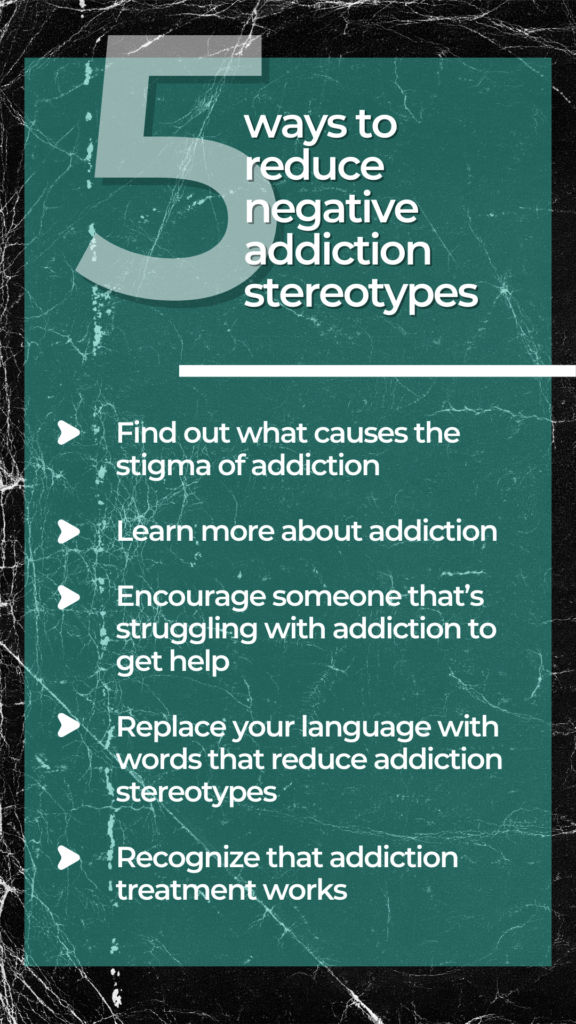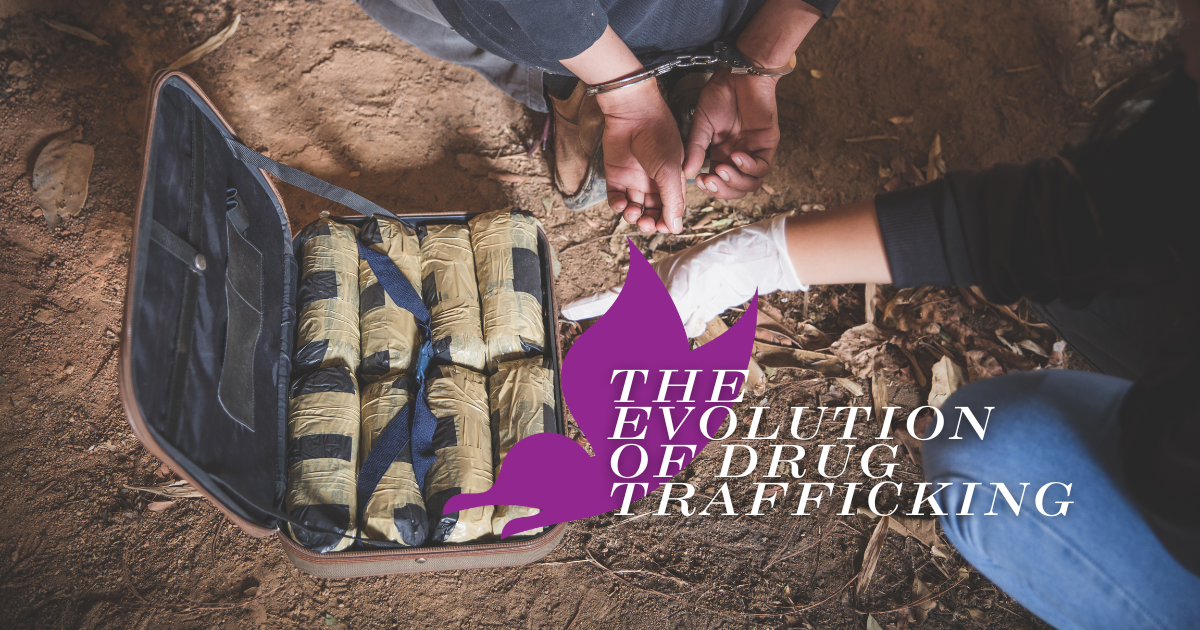The stigma of addiction is a barrier that pushes people experiencing a substance use disorder further away from life-saving treatment. While we’ve seen more sympathy towards those suffering from addiction, and acknowledgment that treatment programs can save lives, there remains an undercurrent of judgment. Critics continue to voice that addiction is the result of moral weakness and poor decision-making. We hear terms like “junkie,” “druggie,” or “alcoholic” that attempt to classify people rather than explain what they’re dealing with.
As drugs and alcohol contribute to thousands of deaths each year and impact the lives of countless others, there’s a desperate need to reduce the stigma surrounding addiction. Although stigma exists in other health conditions like HIV and mental health illness, addiction is often viewed as a character flaw among the general public, including within the healthcare and the criminal justice systems.
Let’s discuss five of the best ways to reduce the stigma of addiction and remove barriers to treatment.
What is the stigma of addiction?
Historically, the word “stigma” has Latin and Greek roots that referred to the term as a mark, brand or tattoo used to visually identify a disgraced person. Nowadays, these marks are associated with negative feelings, labels and stereotypes among society and groups of people that believe poor choices, a lack of willpower and “moral failings” are to blame for addiction. Experts in the addiction industry, however, came to the consensus years ago that addiction is a complex brain condition that impacts impulse control and can cause people suffering from chemical dependence to do things they wouldn’t do to support their drug or alcohol addiction.
For example, a person with opioid use disorder might lie to their doctor or therapist in order to get more drugs. Additionally, someone with an alcohol addiction might drive under the influence and risk criminal penalties or a fatal crash.
5 supportive ways to reduce negative addiction stereotypes

1. Find out what causes the stigma of addiction
Research suggests that the stigma of addiction is rooted in beliefs shared among society and different groups of people that addiction is the result of poor personal choices that often reflect a lack of willpower and a moral failing. According to data from a 2022 survey conducted by market research company OnePoll on behalf of addiction treatment provider Landmark Recovery, 49% of Americans still believe that drug and alcohol addiction is a “choice” rather than a disease (36%). Similar beliefs exist among healthcare professionals that can cause the stigma of addiction to continue.
In 2020, Nora Volkow, the director of the National Institute on Drug Abuse wrote about how some healthcare professionals might not be trained in caring for people with substance use disorder (SUD). Therefore, a nurse or physician might lack the ability or compassion to communicate with a person who might be angry or irritable due to withdrawal or some drugs’ effects. If an emergency room or hospital staff have patients removed without understanding that their behavior is the result of uncomfortable withdrawal symptoms, Volkow said that patients could develop resentment for treatment centers and further delay medical attention that could reverse their condition.
“People showing signs of acute intoxication or withdrawal symptoms are sometimes expelled from emergency rooms by staff fearful of their behavior or assuming they are only seeking drugs,” Volkow wrote. “People with addiction internalize this stigma, feeling shame and refusing to seek treatment as a result.”
Therefore, it’s especially important for people across healthcare, including nurses, physicians and ER/ED staff, to be trained in caring for people with addictions to help make these environments more inclusive and inviting and reduce negative stigmas.
“Treating patients with dignity and compassion is the first step,” she wrote.
2. Learn more about addiction
You don’t have to have personal experience with addiction to learn all you can about the disease. In fact, it would benefit someone struggling with addiction to have a loved one understand their condition so that they avoid negative labels and beliefs. More than 40% of Americans know someone struggling with addiction now, while 57% know someone who’s struggled in the past. Learning as much as possible about addiction and treatment options are great ways to have a healthy response to someone who might be struggling, thus reducing negative stereotypes that are often rooted in a lack of knowledge.
Many beliefs and attitudes surrounding addiction have been formed around media representations and a lack of public knowledge. Crime shows and movies paint people struggling with drugs and alcohol as nothing more than criminals or “junkies,” which can influence the general public. Therefore, public education is another great way to reduce the addiction of stigma.
There’s so much information out there about how drug and alcohol addictions begin. You can also take free online classes to tackle the stigma of addiction. You can always start with the basics of addiction, however, which is understanding how addictions develop and progress. As the Drug and Alcohol Abuse Prevention Program at Prairie View A&M points out, substance abuse starts by:
- Using addictive drugs (illicit or prescribed) for recreational purposes
- Seeking out intoxication every time you use
- Abusing prescription medication
3. Encourage someone that’s struggling with addiction to get help
Addiction is a lifelong disease that requires continued care and support. Once you’re armed with knowledge about addiction, it’ll become that much easier to help someone overcome their condition. Recognizing the signs and symptoms help you plan an intervention, express your concerns and motivate them to enter long-term recovery, whether you’re a family member, friend or co-worker. Encouragement doesn’t always have to be direct, though.
Even if you know someone who’s recently relapsed and returned to drugs or alcohol, you can offer to go to an Alcoholics Anonymous (AA) or Narcotics Anonymous (NA) meeting with them (most are open to the public). If a person dealing with addiction experiences support from loved ones who want to see them overcome their addiction and realize their full potential, they’ll be more inclined to enter treatment and restore their bodies to healthy function.
If you need help encouraging someone you know to seek out some form of addiction treatment, here are four ways to motivate them to go to rehab.
@landmarkrecovery #duet with @onedayofinspiration #brandonnovak Perfectly said! #addictionisadisease #addictionisreal #addictionmindset #wedorecover🙏 #thereishopeforyou #addictiontruth
4. Replace your language with words that reduce addiction stereotypes
Words matter and carry so much power when it comes to eliminating the stigma of addiction. What we say when we talk about people struggling with drugs or alcohol can have a huge impact on whether or not they decide to enter treatment or delay their recovery and reject healthcare options that can help reverse their condition. If you want to help reduce the stigma of addiction, try replacing names and language that shift blame and attention to the person rather than the disease.
Here are a few examples of preferred alternatives to try:
- Say “person with a substance use disorder (SUD)” instead of “addict”
- Say “person with a drug problem” instead of “junkie”
- Say “person with an alcohol use disorder (AUD)” instead of “alcoholic”
- Say “addiction” instead of “drug habit”
- Say “Person in recovery” instead of “Clean (person)”
Michelle Dubey, the chief clinical officer at Landmark Recovery, wrote a great blog about using appropriate language to reshape harmful stereotypes and assumptions around addiction.
5. Recognize that addiction treatment works
Despite the negative stigma that often accompanies addiction, 66% of Americans say they would consider treatment if they developed an addiction to drugs or alcohol. Although there’s been an unprecedented number of drug overdose deaths in the United States, it cannot be overstated that many people who struggle with drug and alcohol addiction survive and recover with professional care and treatment. According to a study from the Recovery Research Institute, more than 22 million American adults have resolved a substance use problem and now live in recovery. About 30% of them used formal treatment options like medical detox or inpatient rehab offered at licensed recovery centers.
Addiction is a complex brain disease that occurs after repeated substance use impacts healthy brain and body functions. When a person develops a chemical tolerance to drugs or alcohol, they might experience mental cravings and physical withdrawal symptoms if they try to limit or quit taking substances altogether. However, brain changes caused by addiction can be treated with life-saving medications approved for medical use by the U.S. Food and Drug Administration that can relieve withdrawal symptoms and reduce cravings:
- Methadone
- Buprenorphine
- Naltrexone (extended-release)
Once drug and alcohol rehab centers return a person’s body to normal function, a combination of behavioral therapy with licensed counselors helps them identify emotional triggers and learn healthy coping skills to avoid relapses. Addiction treatment not only saves lives, but a good majority of Americans would also say it can help reshape the public perception and reduce stigma. Four in 10 Americans would use the word “strong” to describe someone who completed addiction treatment, according to the OnePoll survey conducted on behalf of Landmark Recovery.
Don’t let stigma stop you from getting help
For more information on addiction treatment and sustained recovery, call 888-448-0302 to talk to a recovery specialist at Landmark Recovery. A member of our admissions team can answer questions about treatment and help arm you with the knowledge to reduce the stigma of addiction. The more you know about how medically-managed addiction treatment can save lives or what to call someone with a drug or alcohol problem to avoid mischaracterizing their condition, the better equipped you’ll be to help people overcome addiction and restore their lives. Click here to find a drug and alcohol rehab center near you.

Choose Recovery Over Addiction
We're here 24/7 to help you get the care you need to live life on your terms, without drugs or alcohol. Talk to our recovery specialists today and learn about our integrated treatment programs.




